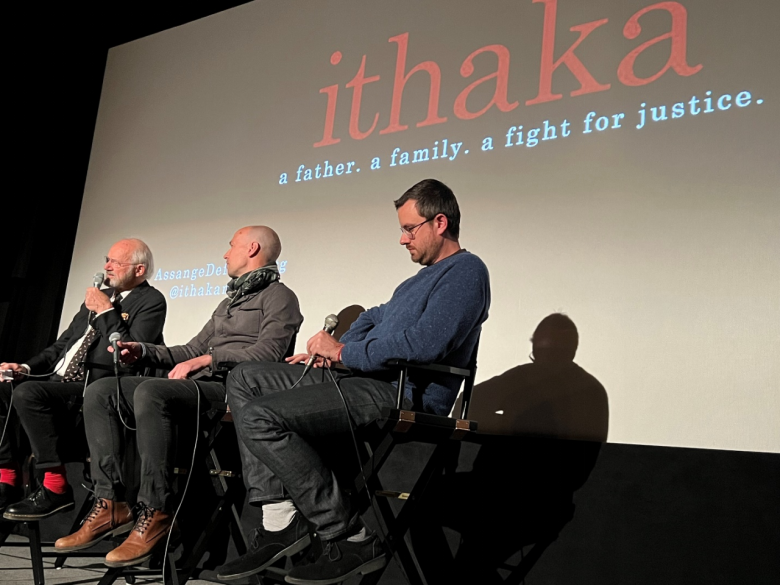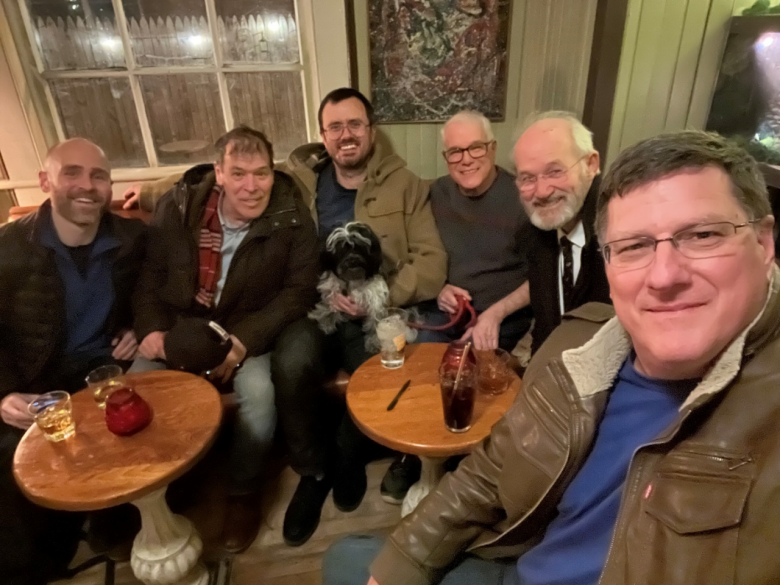Near the end of a question-and-answer session following a screening of Director Ben Lawrence’s new feature-length documentary film, Ithaka, at the Tinker Street Cinema in Woodstock, New York, on March 26th, John Shipton, the main subject of the film and the father of the imprisoned journalist Julian Assange, was asked about the meaning behind the title of the film. I, too, was curious, as nowhere in the movie was the term “Ithaka” mentioned.
John’s response was to quote some lines from a poem written by C.P. Cavafy, widely considered the most distinguished Greek poet of the 20th century. The poem was entitled Ithaka.
As you set out for Ithaka
hope your road is a long one,
full of adventure, full of discovery.
And if you find her poor, Ithaka won’t have fooled you.
Wise as you will have become, so full of experience,
you’ll have understood by then what these Ithakas mean.
As John informed the packed theater, the poem was probably best experienced as delivered by Sean Connery, who recorded a rendition of Ithaka that, per John’s advice, should be experienced by all. But whether uttered in the soft, almost hushed voice of John Shipton, or the bold baritone of Mr. Connery. C. P. Cavafy’s words resonate deeply—especially after having watched Ben Lawrence’s deeply disturbing film.
Ithaka is the story about the journey, not the destination. This is a very difficult concept to handle for most movie goers, who expect a tight narrative to unfold possessing a beginning, a middle, and an ending, with the latter hopefully being uplifting.
In this, Ithaka disappoints by design—there is no beginning, with the viewer being thrust straight into the already unfolding drama of Julian Assange’s incarceration, and the presence of his father, John Shipton, to provide moral support.
The end of the movie finds the audience confronted with the fact that there is no end to the story—Julian remains incarcerated in the hell that is HM Belmarsh, a notorious men’s prison in Thamesmead, in south-east London, England, awaiting extradition to the United States, where he faces up to 175 years imprisonment (a literal death sentence) if found guilty of the charges of espionage being proffered by the US Government.
It is as empty and dark an ending to a film one can imagine, and yet anyone familiar with the tragedy that defines the narrative of Julian Assange over the course of the past decade knew going in that there would not—could not—be a happy ending to this film.
So it is all about the journey,
“And if you find her poor, Ithaka won’t have fooled you,” John Shipton intoned. “Wise as you will have become, so full of experience, you’ll have understood by then what these Ithakas mean.”
The journey of John Shipton and his son, Gabriel, and that of Julian Assange’s lovely, loyal wife, Stella, is as heartbreaking as any story that lacks an ending could be. We know how it ends, and yet, thanks to Ben Lawrence, we are sucked into this journey, as experienced by these three remarkable human beings, until we become one with them, hanging on their every word, every gesture, every nuance, hoping for the justice and humanity this story demands, but which can never be delivered.
It is a crushing journey, one which, John Shipton notes, is similar to that of Prometheus, the Greek God of fire. Prometheus defied his fellow immortals by giving man the gift of fire, only to be condemned by Zeus, king of the Olympian gods, to be bound to a rock, where an eagle would come and tear his liver from his body, only to have the liver grow back overnight, awaiting the eagle’s return, leading to an infinity of torment and torture.
Julian Assange gave humanity the gift of truth. For this crime a wrathful king, in the form of the United States government, has condemned him to a life of imprisonment, forever tortured with the hope of release, only to have hope dashed again, and again, and again.
The hopelessness that emerges from the journey of John, Gabriel, and Stella creates among the audience a false sense of expectation, leading to the inevitable query at the movie’s conclusion about “what can be done?”
“And if you find her poor, Ithaka won’t have fooled you,” John Shipton reminds us.
It is not about the journey’s end. We will find it poor, and we should not allow ourselves to have been fooled thinking otherwise.
The United States will not do right by Julian Assange, or the constitutionally-protected concept of free speech, the exercise of which serves as the foundation for Julian’s Prometheus-like existence today.
The United Kingdom will not suddenly grow a conscience, and release to the loving arms of his family a man whose only sin was to expose the war crimes of an out of control imperial power.
And the American people will not break free of their sheep-like existence, forever looking over their shoulder at the Shephard they think is shielding them from harm but in the end is only leading them to their collective slaughter.
We have arrived in Ithaka, and it is, indeed, poor.
We should have never thought it would be—could be—otherwise.
Laistrygonians, Cyclops,
angry Poseidon—don’t be afraid of them:
you’ll never find things like that on your way
as long as you keep your thoughts raised high,
as long as a rare excitement
stirs your spirit and your body.
Watching the journey of John, Gabriel, and Stella, our thoughts were, indeed, raised high, and we did not, for a moment at least, fear the beasts and angry Gods arrayed before us.
Laistrygonians, Cyclops,
wild Poseidon—you won’t encounter them
unless you bring them along inside your soul,
unless your soul sets them up in front of you.
For a brief time in Ben Lawrence’s film, the audience is so taken in by John, Gabriel, and Stella that we forget that we are watching events that have already transpired, and instead we are one with these wonderful exemplar’s of humanity, joined together on a journey to Ithaka, our collective soul’s purged of the demons that haunt us all, and instead surrounded by the joy of a child’s laughter, the sound of a horse trotting past, the wind in the air, a bird’s song…
Hope your road is a long one.
May there be many summer mornings when,
with what pleasure, what joy,
you enter harbors you’re seeing for the first time;
may you stop at Phoenician trading stations
to buy fine things,
mother of pearl and coral, amber and ebony,
sensual perfume of every kind—
as many sensual perfumes as you can;
and may you visit many Egyptian cities
to learn and go on learning from their scholars.
Keep Ithaka always in your mind.
Arriving there is what you’re destined for.
But don’t hurry the journey at all.
Better if it lasts for years,
so you’re old by the time you reach the island,
wealthy with all you’ve gained on the way,
not expecting Ithaka to make you rich.
Ithaka gave you the marvelous journey.
Without her you wouldn't have set out.
She has nothing left to give you now.
Do not expect Ithaka to make you rich. Do not expect anything at all. Because, in the end, there is nothing but the memory of the experience itself.
No justice.
No peace.
No freedom.
Just the sound of a lone horse’s hooves clacking on the cobblestones as it trots on past toward destinations unknown.
“That’s nice,” John tells us, listening, just as his son, Julian, had, when Stella held up her phone so the modern-day Prometheus could gain a moment’s respite from the eagle’s torture by listening to the sounds of a world that existed outside the confines of a prison cell.
And it was, indeed, lovely.
(Note: If you enjoyed this article, and would like to see more content such as this, please sign up for a paid subscription or provide a donation, so that the author will be able to dedicate the time and energy necessary to continue producing quality content that embodies his motto, “Knowledge is Power.”)




Peter,
From 1994 until 1998 I made some 20 trips to Israel, where I worked with the highest levels of government. I spent many moths in Israel getting to know the people, its history and culture. So I take umbrage at any notion that I am a) ignorant of Israel and its realities, or b) somehow anti-semetic.
I worked closely with Israeli intelligence. In 1998 they published an assessment of the treats faced by Israel. Number one was the threat from the Israeli right. When I look at Israel today, and I see the ascendancy of the Israeli right, I remember that assessment.
I need not remind you I also have extensive experience in the Arab world, and am intimately familiar with the scope and scale of the Arab-Israeli relationship.
Please don't try and lecture me about Israel by trying to impart some sort of notion that I am ignorant of the subject--I am not.
You are free to disagree with me. But please make your arguments fact-based, and not derived from the ignorance you have regarding my resume.
What are you referring to? Israel was never mentioned in this article.